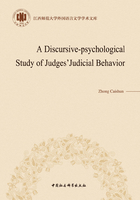
Preface
This book is a recent adaptation of my PhD dissertation submitted to Guangdong University of Foreign Studies in 2009.I was enrolled in its PhD program in forensic linguistics in 2006.Before that,my academic training was mainly on critical discourse analysis(CDA),a theory and method for social research.This aroused my interest in institutional discourses such as law,education and business.That was the main reason I chose judges' discourse practice as my PhD research project.This topic was borne out of a prevalent observation that,despite the speeding-up of law-making in China over the past few decades,the public trust in judicature is lower than expected.Since judges are the gatekeepers of law,looking into their judicial behavior(JJB)shall be an essential juncture to gain insight into Chinese judicature.
This book consists of 7 chapters.Chapter 1 maps out the backdrop to this research.Over the past four decades,much endeavour has been made to institute and reform the judicial system in China.However,the public have not yet placed sufficient trust on it.Among the critiques raised against it,there arises a strong voice to attribute the conundrums of current judicature to judges' qualification.This is,however,not entirely fair since such criticism is out of a prescriptivist rational model.Judicial decision making is indeed more complex than rational principles can address.This book intends to offer an alternative discursive psychological account of JJB,which will show how judges account for their own judicial discourse practice.
In Chapter 2,relevant literature is reviewed to establish the niche for this research.Judges' role is variously defined under different legal systems.In China,judges are not only legal professionals but also Guan,(an incumbent of the officialdom)holding legal,social and political accountability.Such multiple roles are unlikely to be addressed by the reductionist cognitive psychological approach.This book argues that discursive psychology(DP)can provide an ethnomethodological understanding of judges' folk knowledge.
Chapter 3 firstly constructs a theoretical framework for this research.By drawing on Discursive Action Model,Speech Act Thoery,Exchange Structure Theory and Linguistic Anthropology,this book develops an analytical framework to construe judicial discourse order.It is argued that framing and categorizing are the main judicial functions judges' discursive actions aim to fulfill.How such functions are achieved interactionally can be revealed by attending to either structure-generated or category-implicated identities.Secondly,the dataset for this research is elucidated and the steps taken to analyze the data are explained.
From Chapter 4 to Chapter 6,the results of data analysis are discussed.Chapter 4 presents the construction and function of judges' decision constituting discourse.Correspondent with China's judicial trial frame,judges are found to perform four types of discursive actions,i.e.coordinative,inquisitive,representative and attributive.However,each of them is diversely reified due to thetension between structure and contingency in judges' discourse activities.This dynamism is reflected in the sequential unfolding of judges' discourse practice.
Chapter 5 examines how identities are evoked by the judges as a strategy to hold accountability for their judicial behavior.It is found that discourse,situated and transportable identities are all occassioned as the linguistic,institutional and socio-cultural resources by the judges to rationalize their discursive actions.The judges are institutionally situated as the procedure organizer,fact investigator and order maker.In performing these situated identities,two discourse identities are frequently made relevant:interaction initiator and participation controller.The specific forms and their distribution of discursive actions are also shaped by the transportable identities they oriented to.
Chapter 6 aims to provide a theoretical account for contingency and idiosyncrasy of JJB.It is shown that JJB can vary along three dimensions.Firstly,it can be either prodedure-oriented or substance-oriented con tingenton its stake or interest.Secondly,judges can assume a role of authority or solidarity in their discourse style.Thirdly,they can be either paradigmatic or narrative in their mode of thinking.By drawing on Heideggerian Theory of Being,this book argues that JJB is the manifestation of judges' Being or care structure.In this vein,judges' personal order shall be the ontological structure for us to comprehend JJB.
Finally,Chapter 7 concludes the book by summarizing its major findings and its theoretical and practical implications.The limitations of this research are also discussed with suggestions for further studies.
The debts I have incurred in drafting this book go back over many years,and I am fully aware that I cannot acknowledge them adequately enough.I want to mention,however,a few specific contributions.I would like to express my deepest gratitude to my PhD supervisor,Professor Du Jinbang,who gave me tremendous support,constant encouragement and professional guidance throughout my doctoral candidacy.It was he who awoke me to all the wonders that I could enjoy in pursuing forensic linguistics studies.Whenever I foundered or became powerless in my research,he would be the one I could rely on.Most of the ideas in the book emerged in our weekly “academic hill hikes”,an informal forensic linguistics forum served as an arena for both phsycial and intellectual training.
I am also deeply grateful to those professors whose inspiring lectures sparked my interest in academic research.Professor Qian Guanlian and Professor Huo Yongshou guided me through a philosophical tour of language.Professor Liu Jianda provided me with necessary training in statistics.Professor Shen Sanshan helped me to make out an outline of semantics.
My heartfelt thanks should also go to my PhD committee members,Dr.Zhang Xinhong,Professor Xu Zhanghong,Professor Mo Aiping and Professor Yuan Chuanyou.Their valuable comments and suggestions on my research significantly influenced and shaped what the book now is.
My sincere thanks are also extended to my MA supervisor,Professor Wu Zongjie in Zhejiang University.He kindly read my PhD research proposal and offered me insightful suggestions which greatly inspired me to continue this research work.
During the three years in Guangzhou,I also reaped great friendship.Huang Yongping,Cheng Jinshi and Xu Youping were the best companions in times of solitude,confusion and depression.The traces of their ideas can also be found throughtout the books,as we had numerous conversations on this topic.
A huge thank-you is due to my wife(Cheng Weizhen),my son(Zhong Yuxuan),my parents(Zhong Yongshu and Huang Xuanxian)and my brother(Zhong Caifang).Without their love and support,I could not have gone through the enduring ordeal of PhD research.
Finally,I have to acknowledge that the publication of this book is under the auspice of the Academic Excellence Program in Foreign Languages College at Jiangxi Normal University.